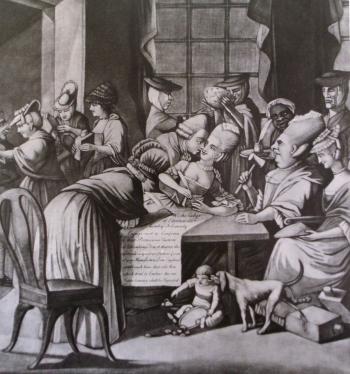 From time to time, the Major asks that the ladies have a tea, usually on Sunday after the service. The last one was on Sunday of May Seige and it was a miracle unto the Loaves and Fishes that a little went such a long way. Maybe that’s because it WAS after the service :o) I have a lot of tea ware but the problem was cups. Somehow or another having red Solo cups just doesn’t quite fit the bill. I had asked permission from the powers to investigate the militia buying a tea set just for the fort and then when I looked into cost- woweee. So the problem still being cups, I came up with a solution and ordered 12 period correct transfer wear china cups, saucers and lids for not very much money (thank God for repros). Now with what I have, we have 15 vessels for drinking tea or whatever we want.
From time to time, the Major asks that the ladies have a tea, usually on Sunday after the service. The last one was on Sunday of May Seige and it was a miracle unto the Loaves and Fishes that a little went such a long way. Maybe that’s because it WAS after the service :o) I have a lot of tea ware but the problem was cups. Somehow or another having red Solo cups just doesn’t quite fit the bill. I had asked permission from the powers to investigate the militia buying a tea set just for the fort and then when I looked into cost- woweee. So the problem still being cups, I came up with a solution and ordered 12 period correct transfer wear china cups, saucers and lids for not very much money (thank God for repros). Now with what I have, we have 15 vessels for drinking tea or whatever we want.
What I propose is to create a new tradition and that is to have a tea every Sunday after service. Since Independence Day is coming up, recreating the EDENTON TEA PARTY might be just the ticket. For your edification, I am reprinting information from the North Carolina History Project concerning the event. The North Carolina Museum of History also has a WONDERFUL article about this event and what led up to it. Please check this out!
Click to access nie08.edenton.tea.party.pdf
Edenton Tea Party
The Edenton Tea Party was one of the earliest organized women’s political actions in United States history. On October 25, 1774, Mrs. Penelope Barker organized, at the home of Mrs. Elizabeth King, fifty-one women in Edenton, North Carolina. Together they formed an alliance wholeheartedly supporting the American cause against “taxation without representation.”
In response to the Tea Act of 1773, the Provincial Deputies of North Carolina resolved to boycott all British tea and cloth received after September 10, 1774. The women of Edenton signed an agreement saying they were “determined to give memorable proof of their patriotism” and could not be “indifferent on any occasion that appears nearly to affect the peace and happiness of our country . . . it is a duty that we owe, not only to our near and dear connections . . . but to ourselves.”
The custom of drinking tea was a long-standing social English tradition. Social gatherings were defined by the amount and quality of tea provided. Boycotting a substance that was consumed on a daily basis, and that was so highly regarded in society, demonstrated the colonists strong disapproval of the 1773 Tea Act. The Boston Tea Party, in December 1773, resulted in Parliament passing the “Intolerable Acts.” It was proof of the Crown’s absolute authority. Following the example of their Boston patriots, the women of Edenton boldly protested Britain’s what they considered unjust laws.
News of the Edenton Tea Party quickly reached Britain. During the 1770s, political resistance was common. But an organized women’s movement was not. So, the Edenton Tea Party shocked the Western world. From England, in January 1775, Arthur Iredell wrote his brother, James Iredell, describing England’s reaction to the Edenton Tea Party. According to Arthur Iredell, the incident was not taken seriously because it was led by women. He sarcastically remarked, “The only security on our side … is the probability that there are but few places in America which possess so much female artillery as Edenton.” The Edenton women were also satirized in a political cartoon published in London in March 1775. Even though the Edenton Tea Party was ridiculed in England, it was praised in the colonies. The women of Edenton represented American frustrations with English monarchical rule and the need for American separation and independence.
Sources:
Lindley S. Butler, North Carolina and the Coming of the Revolution, 1763-1776 (Raleigh, 1976); Richard M. Dillard, “The Historic Tea-Party of Edenton: An Incident in North Carolina Connected with British Taxation,” in The North Carolina Booklet (Raleigh, 1926); William S. Powell, North Carolina Through Four Centuries (Chapel Hill, 1989); and Lou Rogers, Tar Heel Women (Raleigh, 1949).
By Richard Carney, North Carolina History Project


that was very interesting thank you for the information, norma ritchie
LikeLike